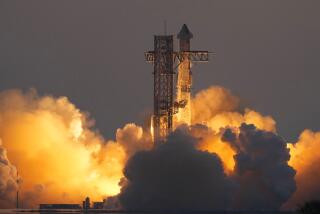Shuttle Booster Damaged; Further Delay Possible
- Share via
WASHINGTON — A booster rocket that was to be tested in two weeks in Utah was damaged when a workman incorrectly installed a test gauge, possibly forcing a further delay in the resumption of space shuttle flights, a NASA spokesman said today.
Edward S. Campion, a National Aeronautics and Space Administration spokesman, said a Morton Thiokol worker damaged the test rocket over the weekend while attempting to install a gauge that was to be used during a test firing.
“It (the gauge) was installed with an incorrect setting which caused the hardware to be damaged,” Campion said. “The effects of this on the test and on a possible delay in the launch are being evaluated now.”
Too Much Pressure
Ed Medal, a spokesman for NASA’s Marshall Space Flight Center in Huntsville, Ala., said the rocket’s center field joint was inadvertently over-pressurized during leak checks.
He said one section of the joint was subjected to pressure of 1,000 pounds per square inch. Another section, he said, was to have been checked at 100 psi, but was mistakenly subjected to the higher pressure.
Medal said it was too early to assess whether the mishap would have any effect on the space shuttle schedule. The Marshall center oversees the booster contract with Morton Thiokol.
Test Required
The rocket engine was to be test-fired in Utah on July 25. Campion said NASA officials have said that that test must be successfully completed before the space shuttle can fly again. Space shuttle Discovery is now on a launch pad at the Kennedy Space Center in Florida and is scheduled to be launched early in September.
Campion said officials are trying to determine how long the test firing in Utah will be delayed by the needed repairs and if this delay will affect the space shuttle launch.
The test rocket in Utah incorporates a new booster design created after the January, 1986, Challenger accident that killed seven astronauts. Space shuttle Challenger exploded after its launch from the Kennedy Space Center. The explosion was blamed on a flawed rocket booster design. The space shuttle fleet has been grounded while the booster was redesigned and tested.
NASA officials said the July 25 test was crucial for clearing the shuttle for the resumption of space flights.
More to Read
Sign up for Essential California
The most important California stories and recommendations in your inbox every morning.
You may occasionally receive promotional content from the Los Angeles Times.









